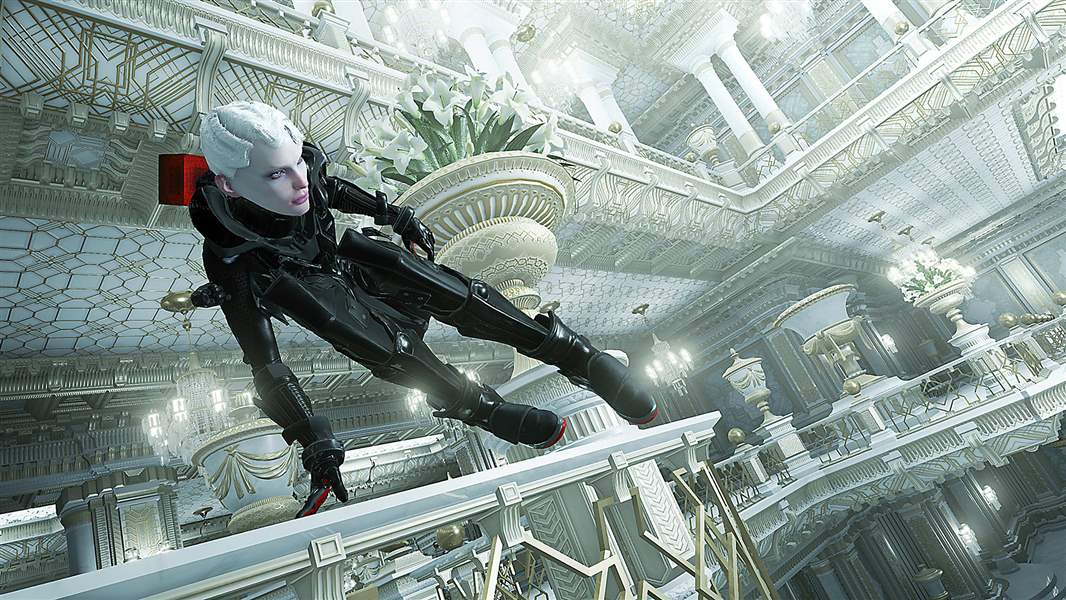
PEACH WEEKENDER | GAME ON
‘Echo’ is a smart, slick sci-fi debut
10/4/2017

A scene from ‘Echo.’
ULTRA ULTRA
Echo, the debut game from the Copenhagen-based developer Ultra Ultra, is a sci-fi, stealth-action title in which the setting, storyline, and gameplay complement each other like a finely wrought piece of architecture. As I threaded my way through it, my thoughts drifted to the work of Jorge Luis Borges whose fiction is studded with labyrinths and infinite spaces — an endless library or a spot on a staircase from which all the points in the universe can be seen. Like the Argentine master’s work, Echo impresses upon players a feeling of the sublime by dropping them into a palace of overwhelming vastness and monstrous symmetries.
In Echo, players assume the role of En, a woman who has been in hypersleep for over 100 years. At the start of her adventure, she is woken up by London, the A.I. onboard her ship. Niceties do not figure into their catch-up chat. The lapsed century has done little to dull London’s bitterness over the loss of his human partner, Fisher, who was hired to find En after she ran away from home. London believes that Fisher died pursuing her, while she contends that she saved Fisher's life by using a technological process to “translate” his dying self into a red cube. Themes of guilt, exculpation, and purpose, run through the storyline. Rose Leslie, who played Jon Snow’s tragic lover, Ygritte, in Game of Thrones, and Nick Boulton are endearingly antagonistic in their roles as En and London, respectively.
For London, talk of reincarnation is nonsense, a hopeless byproduct of En’s upbringing. Through a careful process of gene-editing, En was cultivated to become a “Resourceful” by a man whom she refers to as her grandfather. Resourcefuls were bred to be hyper-competitive people who vied with each other for a chance to journey to a palace said to be full of wonders, not the least of which is its ability to grant immortality. En believes that the palace houses the means to restore Fisher to his human form. Despite his skepticism, London plots a course to the coordinates that En took from her grandfather.
The coordinates lead to an unknown planet where En eventually finds herself standing on a bright cube-like structure. Similar structures extend in all directions as far as the eye can see. After she finds an opening in its surface, she travels down a series of stairs and catwalks that lead to an entryway that segues into a marbled-floor palace. The palace is dark save for the light emanating from En’s spacesuit.
The search for a light source takes En through larger and larger rooms, many of which are packed with gilt-edge furniture. Arched mirrors reflect her image back to her. En finds a key that slots into a device that floods the palace with light from innumerable sources. Later, she inserts the red cube, which she believes contains Foster, into an unknown device. London tells her that this action triggered-palace wide anomalies.
In a room full of chandeliers, the lights flicker, then a blackout occurs as the palace’s systems shut down. When, after a short period of time, the lights go back up, En discovers flowers on the tables around her. The lights then go back off and the palace’s systems fall into a pattern of crashing and rebooting.
As En descends further into the labyrinth, she encounters strange piles of goo that evolve over a few light dark cycles into hostile replicas of herself. Each time a blackout occurs these Echoes reboot and adapt or disperse based on En’s actions from the previous cycle. Although the Echoes will try to choke her on sight, En discovers that they are limited in their movements. They won’t vault over a balustrade, cross through a pool of water, or pull out a gun and shoot unless En performed those actions during a previous light cycle. It’s been awhile since I played a game where the ability to shoot an opponent felt so alternatingly risky and exhilarating.
Echo is a game where your behavior comes back to haunt you. It’s designed to make you think twice about using the range of your capabilities. It constricts you in a way that feels familiar to other stealth action games, e.g. it’s important to study enemy patrol patterns before scampering about, but the mind game it leads you into playing against yourself is what’s most remarkable. At the end of the journey you'll find, as Raskolnikov did in Crime and Punishment, that it’s not killing someone that’s difficult, it’s getting away with it.